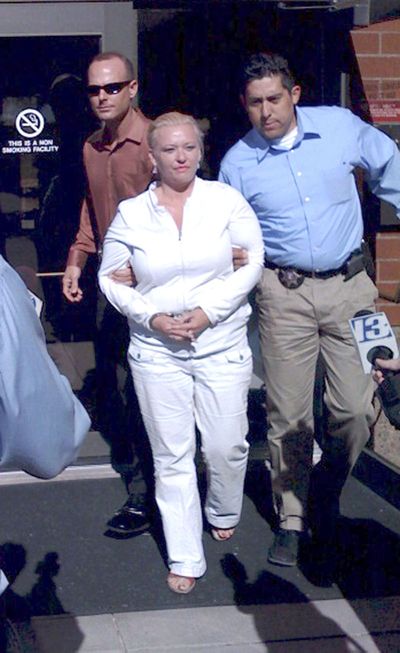Killings sting border watch groups
Members monitored, but some follow own agenda

PHOENIX – The tagline on Shawna Forde’s anti-illegal immigration Web site says her group was “doing the job our government won’t do.” They wanted to patrol the border, but her small band of activists needed money to do it.
So, authorities say, Forde and two men dressed up as Border Patrol agents and broke into the southern Arizona home of a man they thought was a drug dealer, hunting for money or drugs to sell. They found neither, but killed the man and his 9-year-old daughter.
The May 30 killings rocked an anti-illegal immigration movement that prides itself on being vocal but not violent.
The possibility that activists in the anti-illegal immigration movement would use violence did not surprise Heidi Beirich, research director at the Southern Poverty Law Center, which monitors hate groups.
“We figured for a long time that we were going to get violence out of this movement,” she said.
Her organization says the number of hate groups nationwide has risen 54 percent since 2000, fueled by opposition to Hispanic immigration and, more recently, by the election of the nation’s first black president and the economic downturn.
Several groups focusing on stopping illegal immigration formed in the past half-dozen years, and many were drawn to southern Arizona.
“Some are using the movement to promote their own bigoted, racist ideology,” said Brian Levin, director of the Center for the Study of Hate and Extremism at California State University-San Bernardino. “But I want to be clear: That’s not everyone in the movement, and it poses a real problem.”
He said the movement’s message attracts people with ulterior motives. Larger groups try to patrol their ranks for troublesome people but have no power to stop exiles like Forde from starting splinter groups, and even from using the Minuteman name.
After the killings, some of the movement’s leaders quickly distanced themselves from Forde and her Minutemen American Defense group, saying they warned for months that she was potentially dangerous.
“We knew that Shawna Forde was not just an unsavory character but pretty unbalanced as well,” said Chris Simcox, the founder of one of the original border watch groups, the Minuteman Civil Defense Corps.
Forde, charged along with the other men with murder and other counts, declined interview requests, but she had denied involvement in the killings when she was led away after her arrest.
Before coming to Arizona, Forde, 41, lived in Everett, where she ran for City Council in 2007 promising to allow police to check the immigration status of suspects, according to local news accounts.
She became a lightning rod in the community and famous in anti-illegal immigration circles when she alleged that her ex-husband was shot and that she was raped, beaten and shot in retaliation for her activities.
The allegations caught fire and Forde drew a following among online border security advocates. Everett police are investigating the shooting claims but have not made any arrests, police said. An investigation into the rape allegations was closed for insufficient evidence.
In October, Forde showed up at a border-watch event organized by Simcox’s group, he said. She bragged about her own group and said it would be going after drug cartels, which made Simcox worry about the safety of other Minutemen, he said.
“You don’t go pissing off the drug cartels,” Simcox said. “That was something we were not really happy about.”
Forde’s group was small and unorganized, with about 14 members and no formal meetings or activities, said Chuck Stonex, a former group member from Alamagordo, N.M., who severed his ties to the organization following Forde’s arrest.
She often talked about buying 40 acres of land for staging border surveillance activities, he said. “She had her own private agenda,” Stonex said. “She was doing her own thing, and she wasn’t concerned about who she hurt.”